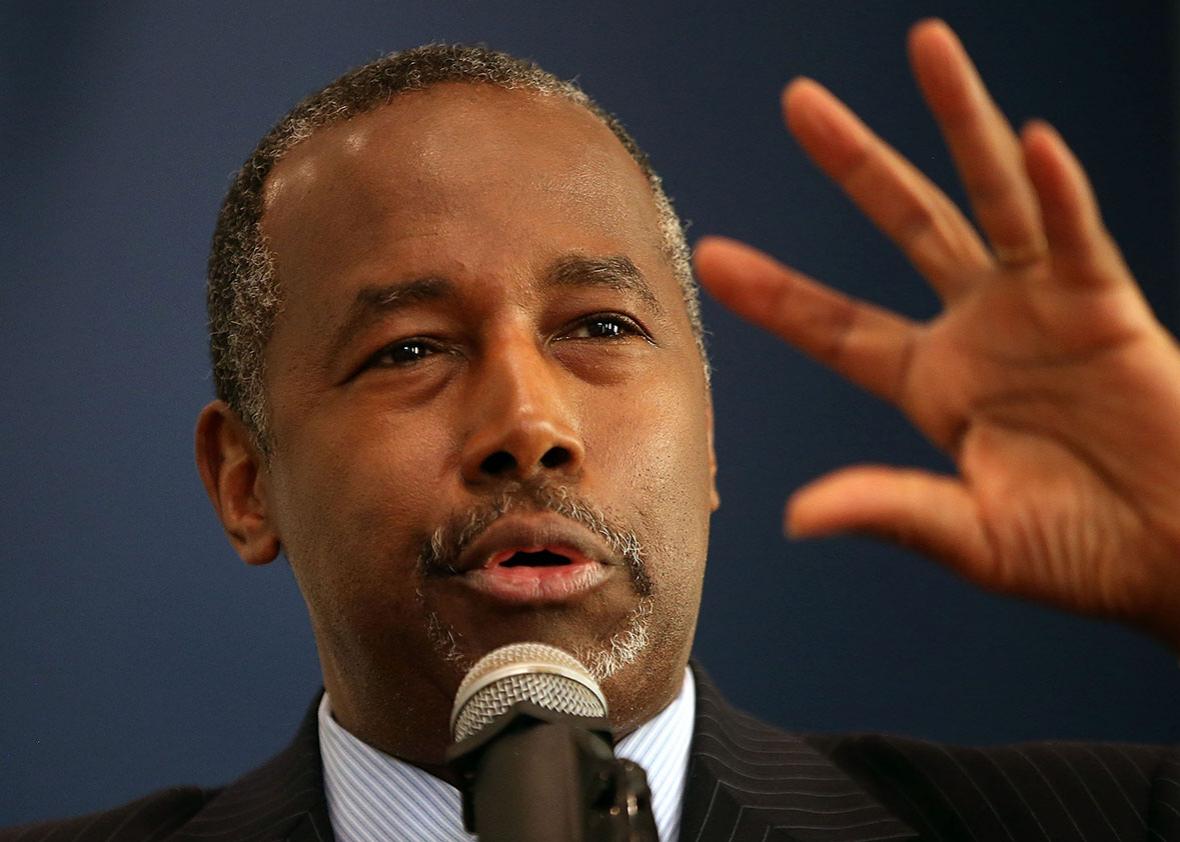Iowa Republicans do more than endure fringe candidates—they embrace them. In Iowa, factional candidates excel and extremists find ground to run. In 1988, Pat Robertson took a strong second in the Iowa caucuses. In 1996, another Pat—Pat Buchanan—came close to toppling Bob Dole. In 2008, Mike Huckabee won the contest, and in 2012, Rick Santorum won a slim victory over Mitt Romney. And ahead of the 2016 Republican presidential contest, Iowa Republicans are poised to give their votes to retired neurosurgeon Ben Carson.
According to the latest poll from Bloomberg Politics and the Des Moines Register, Carson is ahead of the pack with 28 percent of the vote. But more interesting are the facts behind his rise. Iowans aren’t just charmed by his demeanor, his experience, and his inexperience as a politician and policymaker—although that’s definitely true—they also support his most controversial, and entirely ludicrous, ideas.
Bloomberg Politics and the Des Moines Iowa Register asked respondents which views were “very attractive,” “mostly attractive,” “mostly unattractive,” and “very unattractive.” It starts off as you would expect. Eighty-five percent of respondents say Carson’s lack of experience is mostly or very attractive; 88 percent say the same for his skill as a neurosurgeon, while 49 percent say it’s unattractive that he has little experience with foreign policy. Routine, so far.
But then it goes off the rails. Two years ago, at the Values Voter Summit, Carson said that the Affordable Care Act—designed to increase health coverage for millions of uninsured Americans—was the “worst thing that has happened in this country since slavery,” which trapped millions of people in brutal hereditary bondage for more than two centuries. American slavery was a disgraceful chapter in our history that still shapes the structure of our society. Obamacare, by contrast, has delivered insurance and health services to 17.6 million people.
What do Iowa Republicans think? Eighty-one percent say this makes him a “mostly” or “very” attractive candidate.
Last month, Carson voiced opposition to a hypothetical Muslim president. “I would not advocate that we put a Muslim in charge of this nation. I absolutely would not agree with that,” he said. This, despite the Constitution’s clear dictate on religious tests—they’re verboten. What do Iowa Republicans think? Seventy-seven percent say this makes him a “mostly” or “very” attractive candidate.
Two weeks ago, Carson said that guns—in the hands of German Jews—could have slowed Adolf Hitler and even stopped the Holocaust. “I think the likelihood of Hitler being able to accomplish his goals would have been greatly diminished if the people have been armed,” he said. Historians think this is ludicrous. “I can think of no serious work of scholarship on the Nazi dictatorship or the causes of the Holocaust in which Nazi gun control measures feature as a significant factor,” wrote Alan Steinweis for the New York Times. Armed Jews, especially in the years before the war, might have stopped some Nazi violence, but given Kristallnacht—whose pretext was the assassination of a German diplomat by a German-born Jewish refugee in France—it’s just as possible that it would have led to more and worse reprisals for German Jews. Above all, the possibility of more guns does nothing for the vast majority of Jewish victims—Russians, Poles, Hungarians, and others—who were trapped between the Nazi war machine and the Soviet army.
What do Iowa Republicans think? A whopping 77 percent say that Carson’s statement makes him “very” or “mostly” attractive. Overall—presumably based on his beliefs and opinions—96 percent of Iowa Republicans are attracted by “common sense”-based approach to issues. If there’s an area where respondents were unhappy, it’s with Carson’s fetal tissue research as a neurosurgeon. Forty-eight percent find it “mostly” or “very” unattractive. Still, the retired doctor is stunningly popular with Iowa Republicans—84 percent have a favorable view of him.
None of this means Carson will win. The vast majority of Iowa Republicans are still undecided. As the caucus comes closer, their preference might change. And other candidates, like Florida Sen. Marco Rubio, are also popular with GOP voters in the state. What it does mean, if anything, is that Carson speaks the language of Iowa Republicans. They like his rhetoric, whether it’s absurd, ignorant, or genuinely offensive.
With that said, Carson will fade; he has cash, but he doesn’t have a campaign. His money, for the most part, goes to raising more money, not to staffers, offices, or an infrastructure. But when he does, it will be because Republican voters got serious, not because of what he said. And that—if you care about the outcomes of American politics, and not just the spectacle—is troubling.
